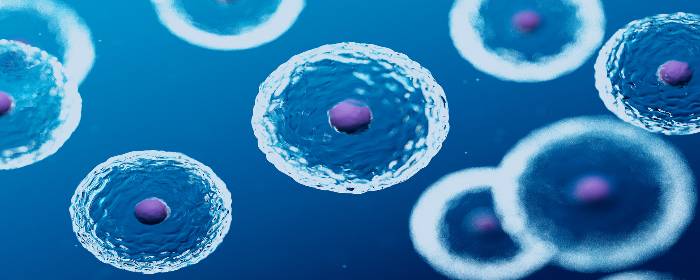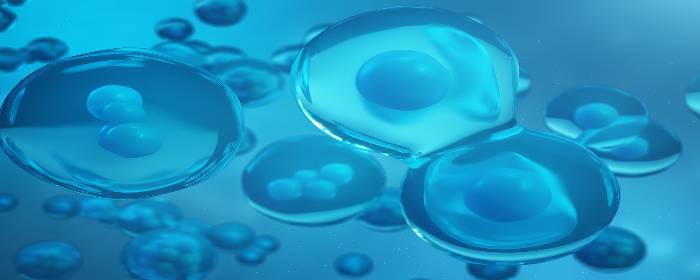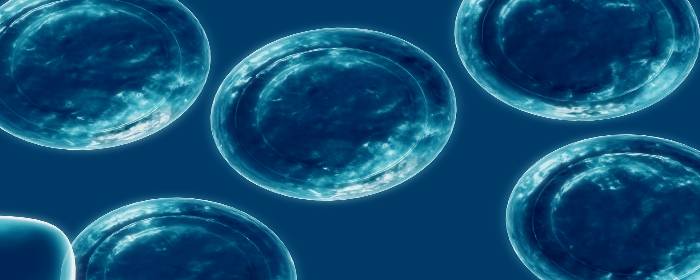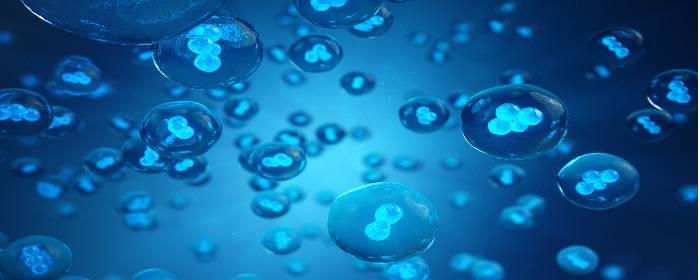
by admin | Jun 14, 2019 | Mesenchymal Stem Cells, Umbilical Stem Cell
Mesenchymal stem cells are believed by many to be the most effective type of stem cell for regenerative medicine. Mesenchymal stem cells are intriguing because they can regenerate damaged tissues in four major ways:
Paracrine effects – Mesenchymal stem cells release substances that can attract other cells to the site of injury. For example, mesenchymal stem cells secrete cytokines to attract cells that participate in wound healing.
Trophic effects – Mesenchymal stem cells release substances that increase blood vessel development and help cells grow and survive.
Immunomodulation – Mesenchymal stem cells have anti-inflammatory properties, exerting beneficial effects in multiple sclerosis, graft versus host disease, Crohn’s disease, ulcerative colitis, and lupus, among others.
Differentiation – Since they are pluripotent, mesenchymal stem cells have the potential to become other cells such as bone cells, fat cells, brain cells, skin cells, blood vessel cells, and many others.
Unfortunately, it can be difficult to collect mesenchymal stem cells. One major source of mesenchymal stem cells is bone marrow. To collect bone marrow mesenchymal stem cells, however, a person (usually the patient) must undergo a procedure to obtain bone marrow. This procedure is invasive and can be uncomfortable. Therefore, researchers are keenly interested in finding other sources of mesenchymal stem cells.
One very attractive source of mesenchymal stem cells is the umbilical cord. For centuries, umbilical cord tissue was considered medical waste. Once a baby was born and the umbilical cord was cut, the rest of the umbilical cord was usually discarded. Approximately 30 years ago, however, researchers discovered that umbilical cords that were destined to be destroyed as medical waste actually contained cells that could be medically useful. Fifteen years ago, researchers showed that cells taken from umbilical cords contained mesenchymal stem cells that have the ability to become other cells (e.g. fat or bone cells).
Since 2004, researchers have discovered an incredible number of potential uses for mesenchymal stem cells that come from umbilical cord tissue. In fact, research shows that mesenchymal stem cells are taken from discarded umbilical cord actually have higher levels of certain helpful genes then mesenchymal stem cells taken from fat tissue, bone marrow, or skin. Perhaps most impressively, umbilical cord mesenchymal stem cells are non-tumorigenic, which means they do not produce tumors.
Today, mesenchymal stem cells derived from the umbilical cord are the subject of intense clinical research. There are approximately 100 clinical trials testing the safety and effects of umbilical cord mesenchymal stem cells in over a dozen different diseases. In all clinical studies, these stem cells have proven to be remarkably safe—there have been no side effects reported aside from a temporary fever in some cases.
Taken together, these results suggest human umbilical cord is an excellent source of mesenchymal stem cells for several reasons. Unlike embryonic stem cells, there are no ethical problems collecting umbilical cord tissue for stem cells. These particular stem cells appear to be a bridge between prenatal and postnatal mesenchymal stem cells and possess the beneficial properties of each. They do not form tumors, but they do grow in number and become adult cells. As such, human umbilical cord mesenchymal stem cells are unique and are a promising resource in regenerative medicine.
Reference: Arutyunyan, I. et al. (2017 Umbilical Cord as Prospective Source for Mesenchymal Stem Cell-Based Therapy. Stem Cells International. 2016:6901286.

by admin | May 30, 2019 | Lupus, Mesenchymal Stem Cells, Stem Cell Research, Stem Cell Therapy, Umbilical Stem Cell
Systemic lupus erythematosus or simply “lupus” is a chronic inflammatory disease that can affect almost every organ and tissue in the body. Most people are aware of chronic fatigue, muscle and joint pain, and a characteristic facial skin rash that occurs in people with lupus. However, the disease can affect the gastrointestinal tract, lungs, heart, eyes, lymph nodes, and brain. About half of all people with lupus will develop problems in their kidneys related to the disease. The most common kidney problem caused by lupus is a condition known as lupus nephritis.
Lupus nephritis may not cause any outward symptoms, though some patients report foamy urine. Physicians usually detect lupus nephritis during routine urinalysis. Lupus nephritis causes the kidneys to leak substantial amounts of protein in the urine. Over time, this protein loss can cause swelling in the hands, ankles, and feet, and may interfere with kidney function.
The main way in which lupus nephritis is treated is by using strong immunosuppressants such as glucocorticoids (“steroids”; prednisone), cyclophosphamide or mycophenolate mofetil. These immunosuppressing drugs can cause a number of serious and perhaps permanent side effects. Making matters worse, some people with lupus continue to have worsening lupus nephritis even after using these immunosuppressive drugs. In these cases, there is very little that can be done to treat the disease.
In order to help this group of individuals for whom regular treatments did not stop lupus nephritis from progressing, researchers conducted a clinical trial to test the effect of stem cells on this illness. Researchers collected allogeneic mesenchymal stem cells from bone marrow and umbilical cord tissue. They then infused the stem cells in 81 patients with lupus nephritis and followed them for 12 months. Amazingly, 60.5% of patients enjoyed remission of their kidney disease by the 12-month visit. Kidney function (glomerular filtration rate; GFR) significantly improved in patients treated with mesenchymal stem cells. Likewise, total lupus disease activity (not just lupus nephritis) improved significantly 12 months after treatment. These improvements were so profound that patients were able to reduce their doses of prednisone and other immune-suppressing drugs. Importantly, the stem cells did not cause any apparent adverse effects.
If this work can be confirmed in subsequent clinical trials, it is exciting news for patients with lupus, especially those with lupus nephritis. This work suggests that stem cells may be able to reduce the doses of immunosuppressants currently used to treat lupus nephritis, and it may even stop the progression of this terrible illness in some patients. We eagerly await additional clinical research in this area.
Reference: Gu F et al. (2014). Allogeneic mesenchymal stem cell transplantation for lupus nephritis patients refractory to conventional therapy. Clinical Rheumatology. 2014 Nov;33(11):1611-9.

by admin | May 22, 2019 | Bone Marrow, Mesenchymal Stem Cells, Stem Cell Research, Stem Cell Therapy, Umbilical Stem Cell
Mesenchymal stem cells have two unique and powerful properties that make them the focus of intense scientific research. First, mesenchymal stem cells can escape recognition by the immune system. In other words, when mesenchymal stem cells are infused into the body, the immune system does not recognize them as foreign and does not react to them. If the immune system did respond to the stem cells, it would cause an aggressive and potentially deadly allergic or immunologic response. Second, mesenchymal stem cells have the power to inhibit the immune system. This means mesenchymal stem cells could be used to treat immunological and autoimmune diseases such as Rheumatoid Arthritis, Systemic Lupus Erythematosus, Multiple Sclerosis, and Crohn’s Disease, among others. In essence, mesenchymal stem cells can affect the immune system without triggering an inflammatory response making them an ideal treatment for these diseases.
For some time, mesenchymal stem cells extracted from bone marrow were thought to be the only type of mesenchymal stem cells capable of beneficially affecting the immune system. This fact is not necessarily bad, but it does mean that mesenchymal stem cell donors must undergo a bone marrow procedure, which can be painful and expensive. It would be far better if doctors could use mesenchymal stem cells taken from easier-to-get tissues such as fat (adipose), umbilical cord blood, or Wharton’s jelly (umbilical cord tissue). Most people have adequate amounts of fat just under the skin, and umbilical cord blood and tissue are thrown away as medical waste every day.
Fortunately for patients, Dr. Yoo and colleagues showed that mesenchymal stem cells taken from fat tissue, umbilical cord blood, and Wharton’s jelly exhibit the same immunomodulatory properties as mesenchymal stem cells taken from bone marrow. The researchers showed that these types of mesenchymal stem cells were able to suppress T-cell proliferation as effectively as those cells taken from bone marrow. T-cell proliferation, it should be pointed out, is a key step in autoimmune inflammation that occurs in diseases such as rheumatoid arthritis and others.
In short, mesenchymal stem cells taken from easier-to-get tissues were just as effective at suppressing inflammation (in vitro) as those taken from bone marrow. These results will need to be confirmed in clinical studies; however, this approach will be much more convenient and less expensive for patients and donors if they can use mesenchymal stem cells taken from fat or umbilical cord rather than bone marrow and yet reap the same benefits.
Reference: Yoo KH et al. (2009). Comparison of immunomodulatory properties of mesenchymal stem cells derived from adult human tissues. Cell Immunology. 2009;259(2):150-6.

by admin | May 16, 2019 | Mesenchymal Stem Cells, Multiple Sclerosis, Stem Cell Research, Stem Cell Therapy
A new study has shown that a protocol for treating Multiple Sclerosis with stem cells is safe. According to the researchers, the potential for using stem cells in Multiple Sclerosis therapy warrants further investigation. The results of the study were published in the Journal of Translational Medicine.
Stem cells – and specifically, mesenchymal stem cells, have been increasingly used in the treatment of immune and inflammatory conditions. Based on the success that has been seen in these areas, scientists reasoned that mesenchymal stem cells may also represent a useful approach to treat Multiple Sclerosis, a neurological disease that involves the abnormal attack by the immune system on the myelin sheath that insulates nerves and allows nerve cells to communicate effectively and efficiently with one another.
To test this idea, the scientists used umbilical cord mesenchymal stem cells in 20 Multiple Sclerosis patients. The patients were given intravenous injections of the stem cells each day for seven days. The researchers evaluated the patients – with both neurological testing and nervous system imaging – at baseline, one month after treatment, and one year after treatment. The researchers found that the stem cell treatment improved neurological scores in patients and that lesions in the brain and cervical spinal cord were inactive one year after the stem cell injections. There were no serious adverse side effects associated with the treatment.
Based on these findings, it is possible that stem cells will provide a useful treatment option for those with Multiple Sclerosis. With more research, we will better understand exactly how stem cells can be used to help this population of patients.
Reference: Riordan, N.H. et al. (2018). Clinical feasibility of umbilical cord tissue-derived mesenchymal stem cells in the treatment of multiple sclerosis. Journal of Translational Medicine, 16(57), 1-12.

by admin | May 13, 2019 | Mesenchymal Stem Cells, Stem Cell Research, Stem Cell Therapy
Erectile dysfunction is the most common sexual disorder among men. During an erection, blood enters the tissues within the penis and is temporarily trapped there. In erectile dysfunction, however, this process does not occur. A man who suffers from this condition is unable to achieve a penile erection sufficient for sexual intercourse.
Erectile dysfunction has many causes ranging from neurological conditions to vascular (blood vessel) conditions to psychological conditions. In most men, erectile dysfunction is caused by a problem in blood flow and nitric oxide production, which is why drugs like the Viagra and Cialis are effective for some men because they temporarily reverse these problems.
Results from a review of 54 research studies showed that stem cell-based therapies may be able to reverse these effects on a more permanent basis. For example, mesenchymal stem cells were able to increase the number of enzymes that produce nitric oxide. Likewise, mesenchymal stem cells increased the size of penile tissue in older rats. Indeed, stem cell injections were able to restore erectile function in rats with diabetes.
Based on these laboratory results, researchers have conducted clinical trials using stem cells to treat men with erectile dysfunction. In one such trial, researchers used a person’s own fatty tissue (adipose) to generate stem cells. They then injected those cells into men with erectile dysfunction. Eight out of 11 men treated with stem cells regained erectile function. In another small study, eight men with profound erectile dysfunction in whom oral ED treatments failed received placenta-derived stem cells. Two of the patients were able to achieve and sustain erections six weeks after treatment while an additional patient was able to do so after three months.
Laboratory studies of stem cells in the treatment of erectile dysfunction are extremely promising. The clinical studies in this area are limited, and the results are somewhat less impressive. Nonetheless, as improvements and refinements are made to stem cell technology, this approach could offer hope to men with erectile dysfunction, especially those men who have not been helped by ED drugs.
Reference: Albersen, M. et al. (2013). Stem-cell therapy for erectile dysfunction. Arab Journal of Urology. 2013 Sep; 11(3): 237–244.

by admin | May 3, 2019 | ALS, Mesenchymal Stem Cells, Stem Cell Therapy
Amyotrophic lateral sclerosis or ALS is a neurological disease that causes muscle weakness, profound disability, and ultimately death. ALS is sometimes referred to as Lou Gehrig’s disease, named for the New York Yankee baseball player who developed the condition later in his life. Notably, physicist Stephen Hawking long suffered from the condition.
ALS affects the nerves that control movement. As nerve cells become dysfunctional and die, a person’s muscles become weak. The disease often starts with weakness in one part of the body before moving to other parts. In 4 out of 5 people with ALS, the first symptom is a weakness of one limb but not the other. Over time, however, the disease spreads to virtually all motor neurons (nerve cells) in the body. Eventually, patients are unable to walk because of muscle weakness and are usually confined to a wheelchair. The condition becomes particularly difficult to manage and potentially life-threatening when it starts to affect lung muscles, which make it hard for patients with ALS to breathe.
There is no cure for amyotrophic lateral sclerosis. For the most part, however, treatment for ALS focuses on reducing the symptoms of the condition rather than treating it. Patients often undergo intensive physical, occupational, and speech therapy regimens to help manage symptoms of ALS. Physicians may prescribe drugs to reduce muscle spasms, sleep problems, and pain associated with the condition. Researchers are constantly looking for ways to improve ALS treatment.
Dr. Petrou and co-authors recently reported clinical trial results in the highly regarded medical journal, JAMA Neurology. The researchers started their research by altering mesenchymal stem cells in the laboratory so that they produce neurotrophic growth factors. In other words, they engineered stem cells to release substances that help nerve cells grow and survive. Then they tested these stem cells in two clinical trials. In the first clinical trial, the doctors used these stem cells to treat six patients with early-stage ALS and six patients with advanced ALS. In the second clinical trial, they tested the stem cells in 14 patients with early-stage ALS.
All patients in both trials tolerated the stem cell treatments very well. There were no serious side effects related to treatment. 87% of the patients responded positively to treatment, which means they showed at least 25% improvement in physical function and/or lung function. These positive results from stem cell treatment are particularly impressive because ALS gets worse over time. Patients generally either stay the same or get worse—it is quite unusual for them to get better. Encouraged by these results, the researchers who worked on this study will now confirm these results in larger clinical trials. The hope is that this stem cell treatment will be available for patients with ALS in the coming years.
Reference: Petrou P. et al. (2016).Safety and Clinical Effects of Mesenchymal Stem Cells Secreting Neurotrophic Factor Transplantation in Patients With Amyotrophic Lateral Sclerosis: Results of Phase 1/2 and 2a Clinical Trials. JAMA Neurology.2016 Mar;73(3):337-44.







 St. Petersburg, Florida
St. Petersburg, Florida
